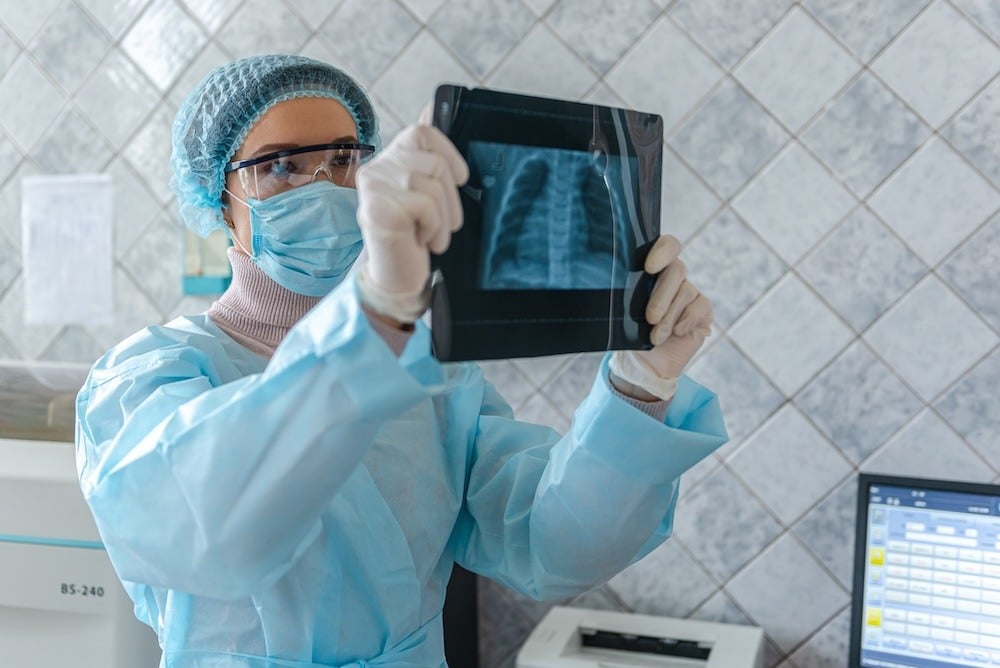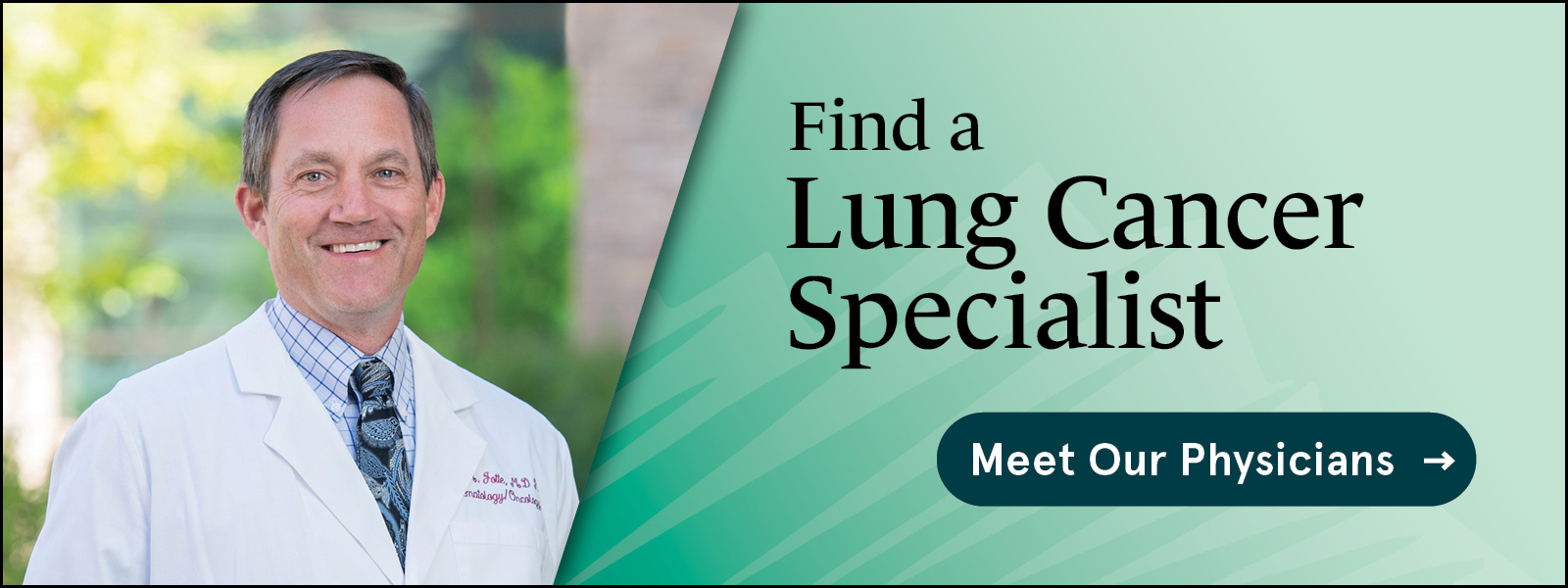Lung Cancer Surgery: What to Expect
5 min read

Although lung cancer is still a common form of cancer among both men and women, there is more hope than ever before for patients with this disease. Thanks to new and more advanced treatments, patients are now surviving longer. Another reason for better outcomes is the development of lung cancer screening. For those who qualify, lung cancer screening makes it possible to detect cancer earlier when surgery is still a viable option.
Is Surgery Required for Everyone With Lung Cancer?
It’s best to meet with a lung cancer oncologist and a lung cancer surgeon to determine what's right for you. If possible, select a medical oncologist who specializes in lung cancer. The oncologist will discuss the specific details of your diagnosis and serve as the treatment team's leader. The oncologist regularly works with at least one thoracic (chest) surgeon who specializes in the surgical management of lung cancer. You will likely meet separately with the surgeon.
Early-stage lung cancer can often be successfully treated with surgery. However, surgery may not be included in the treatment process if found at a later stage. That’s because the cancer cells have spread across the lungs and possibly to other organs, making surgery less effective at removing all of the cancer.
If surgery is recommended, the surgeon will discuss the specifics of which surgery they’ve chosen and why. The oncologist and surgeon work closely together to determine the timing, type of surgery, and any necessary treatments required beforehand.
Types of Surgery for Lung Cancer
Surgery for lung cancer involves removing the tumor, along with nearby lymph nodes and some of the surrounding healthy lung tissue called the margin. The type of surgery will depend on how large the lung cancer has grown and if there are several spots in one area of the lung or across the entire lung.
- Wedge resection involves taking out the tumor with a margin of healthy lung tissues. This technique may be used if the surgeon cannot remove an entire lobe of the lung.
- Segmentectomy is another technique used when it's not possible to remove an entire lobe. The surgeon removes part of the lung where the tumor is located. This procedure involves removing more lung tissue and lymph nodes than a wedge resection.
- Lobectomy is the removal of an entire lung lobe. It is considered the most effective surgery, even for small tumors. Clinical trials are investigating whether less invasive surgeries provide similar outcomes for tumors that are two centimeters or smaller.
- Pneumonectomy involves removing the entire lung in cases where the tumor is close to the center of the chest. Your heart and lung health will need to be evaluated beforehand as the risks of this procedure are higher than those of a lobectomy.
How Is Lung Cancer Surgery Performed?
There are two types of approaches the surgeon can use: open surgery (thoracotomy) or minimally invasive surgery (thoracoscopic or robotic surgery).
- Thoracotomy involves making a large incision between the ribs on the side of the chest. This allows the surgeon to visualize more of the cancer and remove any additional cancerous tissue found during the procedure.
- Minimally invasive surgery involves making a few small incisions to access the inside of the chest. This is also called laparoscopic surgery and typically results in a shorter recovery. The surgeon uses a camera and special instruments to perform the surgery. This type of surgery is known as thoracoscopy or video-assisted thoracoscopic surgery (VATS). A surgical robot can also assist in reaching areas in the lung that the surgeon’s hand cannot reach.
How to Prepare for Lung Cancer Surgery
What to Expect Before Surgery
Before your surgery, you may need to undergo certain lung function tests to ensure you are healthy enough for the procedure and to assist your lung cancer surgeon in making informed decisions. A care team member will also inform you of what foods and drinks to consume or avoid 24 hours before the procedure and which medications to take.
If you are a smoker, we encourage you to quit. Not only does this promote overall wellness, but kicking the habit as far before your surgery as possible can influence how quickly you recover.
Read more: The Leading Cause of Lung Cancer Deaths? Yes, It’s Smoking
This is a good time to arrange assistance while you recover from surgery, including transportation to and from the hospital. Additionally, review your health insurance coverage with the surgeon’s office so you will know what to expect for payments before and after surgery.
What to Expect After Surgery
After your surgery, you will be taken to your room to start the recovery process. The time it takes to recover from lung surgery depends on the amount of the lung that is removed and your health before surgery. It is natural to feel groggy and experience pain when you wake up, but your care team can provide you with medicine to ease the discomfort.
If you had chest tubes inserted during the surgery to assist in draining fluid and blood from your chest cavity, they would be removed once the fluid drainage slows down. Patients who need to keep the tube in place while going home will be taught by their care team how to care for it.
The length of your hospital stay and recovery depends on the type of surgery you had. The goal is to help you regain strength and resume your daily routine. For this reason, you'll be encouraged to start moving as soon as possible. You may also receive some breathing treatments to enhance lung function. Before leaving the hospital, your oncologist or nurse will provide instructions for at-home care.
Once you’re home, it is important to focus on your recovery. You should rely on your support network to help with cooking, cleaning, and grocery shopping. Speak to your doctor about any restrictions you may have and what types of activities you should be doing. Shortness of breath with activity after surgery is common, but it usually improves over time. However, for some patients, this might be permanent. Inform your oncologist if you experience any physical or emotional pain or discomfort. They may recommend palliative care, which provides medical, social, emotional, and practical support to help improve your quality of life so you can live as well as possible.
Possible Side Effects of Lung Cancer Surgery
Take some time to review the possible side effects after lung cancer surgery. This makes it easier to prepare for your recovery and manage potential challenges that may come up. Side effects associated with lung cancer surgery include:
- Pain and discomfort in the chest area, especially when taking a deep breath
- Fatigue
- Wound infection
- Breathing difficulties
- Visible scarring from the surgical procedure
- Complications such as bleeding, blood clots, pneumonia, or damage to surrounding organs
Your surgeon will review what’s expected for your situation and type of surgery.
Additional Lung Cancer Treatments May Be Needed After Surgery
Sometimes, even if the surgeon successfully removes all the cancer visible during the operation, there may still be some cancer cells left behind that cannot be seen. In such cases, your oncologist may recommend additional lung cancer treatment, such as chemotherapy or radiation therapy, after the surgery. This type of treatment is called adjuvant therapy, and it is given to reduce the risk of the cancer returning.
Lung Cancer Treatment in Colorado
Rocky Mountain Cancer Centers offers a comprehensive approach to lung cancer care, with a team of dedicated specialists providing personalized treatment plans. The right timing for each treatment, including surgery, will be carefully planned for your specific needs. Our lung cancer oncologists are available for an initial consultation or a second opinion at our locations throughout the Front Range of Colorado, including the Denver area, Boulder, Colorado Springs, and Pueblo.

